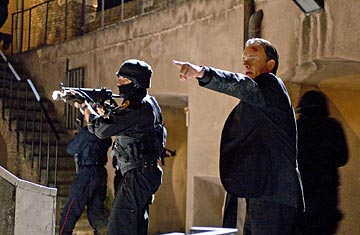
Tom Hanks in Ron Howard's Angels & Demons
(2 of 2)
As transparent as this device is, Angels has elemental satisfactions in its blend of movie genre that could appeal to wide segments of the audience. For Hollywood's core demographic, this is a serial-killer thriller, not far from the Saw series in its devoutly clinical depiction of distressed bodies. (See the eyeball on the floor! Gasp as plump rats snack on a dead Cardinal's face!) For adults who are or were Catholic, the movie is a backstage story of Vatican politicking, à la Monsignor and The Godfather Part III; it paints the College of Cardinals as possibly the only ruling body older and more removed from mundane realities than the U.S. Supreme Court. For conspiracy buffs, there's the notion that the Holy Fratricide might be an inside job, which recalls the double-switch scheming of The Manchurian Candidate.
Some of the cast members are given room to create plausible characters. McGregor seems the very model of a vigorous, committed young prelate, the kind you wouldn't mind having as your kids' teacher. Skarsgard and Mueller-Stahl let a ray of humanity peek from under their official frowns. Zurer, the Israeli actress who ornamented Steven Spielberg's Munich, has the strong features and intellectual mien that nerds like me find irresistible.
They're all very watchable, which helps compensate for the necessary cipher at the center. Not that Hanks is bad; there's just no person for him to play. Given that it's the only role the actor has returned to in his live-action film work (he's repeated as the voice of Woody in Pixar's Toy Story franchise), it's a shame that Langdon doesn't play to his strengths: the fretful and impatience that rise to heroism. Here he's a simple conduit for information, the docent on our tour of Roman churches.
Why he is chosen to lead the tour is a thornier question. The essentially reverent Angels, which portrays the Catholic hierarchy as the victim, not the perpetrator, of a grandly evil plot, was written before The Da Vinci Code. So in the order of publishing, it made sense that the church would initially allow Langdon to pursue his doctrinal theories. In the order of the movies, though, it beggars belief that Langdon, having exposed a truth the Vatican has suppressed for millennia, would be asked to consult on the kidnapped-Cardinals caper. Yet apparently L'Osservatore Romano doesn't hold a grudge. After all the Da Vinci grief, it gives a thumbs-up to the new movie — or, in the unlikely event the review was written by a clergywoman, a nuns-up.
Then again, just because the Vatican has laid hands on Angels & Demons doesn't mean some people don't detect an unholy conspiracy. In the Christian Film and Television Commission's biweekly Movieguide, Ted Baehr wonders, "How much of the box office of Angels & Demons will end up in the Democrat campaigns? If it makes money, it could be a lot."
That's right, Mr. Baehr: Howard and Hanks are tithing to the Democratic Party, which as everyone knows is the political arm of the satanic conspiracy. He might also have mentioned a suspicious bit of numerology: the worldwide box-office gross of The Da Vinci Code, if you subtract what the movie earned in the heathen countries of Japan and China, came to almost exactly... $666 million.
Read TIME's 2006 cover story "The Opus Dei Code."
See pictures from inside Opus Dei's headquarters in New York City.
